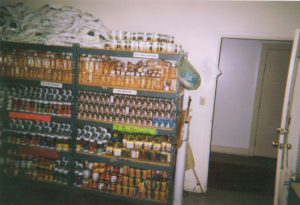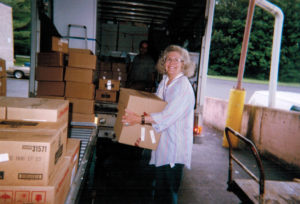September 20, 2020 at 8:04 pm




This is the time of the September Solstice. On this week, please take a moment to visualize a world where good health, positive renewal exist. See a world with enough food, housing, health care, and education.
See adequate housing, nutritious food, and reliable quality health care become real for everyone.
Reflect on a world where goals and dreams of everyone become achievable. Spread seeds of hope and growth throughout our planet. Include abundance for those with insufficient resources for housing, food, and healthcare.
Honor the change of seasons which is upon us now. Breathe in deeply the smells and feel of autumn.
Give yourself the support you need to achieve your personal goals. Invite balance and abundance into your life.
See a world where all beings live and thrive in peace and harmony.
Include a world where social justice prevails.
Include a world where the hungry are fed.
Thank you for reading this meditation.
Please refer this article to your preferred social media network. Please forward this post to friends who might enjoy this post.
You can connect with me on Facebook.
Thanks again.
Thurman Greco

February 8, 2017 at 12:36 pm

Another year has begun again. (And, far too quickly, too.)
As I begin another year fighting hunger, God, my time with the pantry is in your hands.
Give me patience again, O God. And let me remember that it’s my job to offer the best, most delicious, nutritious food I can find for the hungry.
It is not my job to end hunger. Let me remember, God, that you have your own timetable.
As a year begins give me wisdom and grace to serve the hungry with respect and honor…which they deserve. Give me energy and strength to trust that those who have enough will continue to give so we will have the money to continue to feed the hungry as long as we need to.
Donations to the food bank have worked beautifully up to now, God. Give me the strength to trust the system to work in the new year too. Let me trust in the miracles of this system.
And, God, thank you for giving me comfort when I grow discouraged. Forgive me for not being stronger.
Thank you for giving the money, volunteers, and resources the pantry needs to continue to feed the ever increasing number of people whose paychecks are not going up but their gasoline, rent, and food costs are rising.
Thank you for the miracles you give us daily.
I say these things in your name and with gratitude from the bottom of my heart, O God.
Amen
Thank you for reading this blog post!
Please refer this prayer to your favorite social media network.
This prayer is one of a series of entries I’m writing to go in a memoir about hunger. It will be entitled “I Don’t Hang Out In Churches Anymore – the story of hunger as told through prayer”.
Thurman Greco
December 8, 2015 at 9:29 am

At a time when people are busy wrapping gifts and planning festivities, some are struggling just to pay the rent and buy gas to get to work. Hungry is not a category of people. It’s a situation that happens. It can happen to anyone. December is especially hard on those visiting a food pantry for the first time. It’s the reason I write this guide
Leave fear, embarrassment, shame, tears at the door. Most people using pantries are finally in a place where they can rebuild and heal. When the struggle for food is relieved, life finally feels as if it’s getting better. For many, the pantry is a safe place. This is a good group to join.
Arrive a hour before the pantry opens This makes for a long wait but there’s a better selection right at the beginning. Use this time to network with your line neighbors. They can be a resource if you’re trying to navigate your way through Department of Social Services, being foreclosed upon, get your car repaired.
Learn how long you’ll be in the shopping room, what foods are usually found on the shelves, whether you get to choose the food or receive a bag of groceries, what other pantries people shop at.
Bring some ID. Some pantries require much: photo ID, proof of residence, proof that other family members exist.
Once you’re registered, shop every time you’re allowed. With luck, you’ll find a pantry offering weekly visits. People sometimes just don’t go if they still have any SNAP card (food stamp) money or if they have a few bucks left over from a paycheck. Pantries have different food every week and you may miss out on some real savings by not shopping often.
Some pantries have periodic visits from nutritionists offering recipes and food tastings. Don’t be shy. Ask for information you need to adjust to the new way of cooking offered by pantries where food choices are different from the super market. If you’re suddenly cooking with only a crock pot or microwave, the nutritionist can be a valuable resource.
You may see fresh fruits and vegetables you don’t recognize. At each pantry visit, take home one new food, find a recipe and prepare it. If you do this, your cooking skills will be vastly improved over time.
Volunteer. Giving away food and sharing smiles with those around you offers its own spirituality. You’ll interact with people you never thought in your wildest dreams you would ever even meet. Pantry shoppers are traveling down a path away from hunger. Go with this journey which opens the door to inner growth.
Stick with this new routine. It’s the 21st century way to get delicious, nutritious groceries for your household. It’s been years since pantries offered exclusively emergency food.
Thank you for reading this blog/book.
Please share this article with your preferred social media network. Also, please share this information with anyone who may be able to use it.
Don’t forget to join the email list.
Peace and food for all..
Thurman Greco
September 15, 2015 at 6:49 am

1. Children learn better. Studies show children who eat breakfast in the classroom score better at math, reading tests. Breakfast helps students pay attention to the teacher. Their memory is improved. Children behave better if they are not hungry.
2. Breakfast in the classroom helps fight childhood obesity. School meals follow nutritional guidelines. Breakfast is more nutritious than it might otherwise be.
3. Not all children eat before coming to school. They may not have an appetite when they first wake up. There may not be nutritious food in the home. They may be too busy to eat. That means they lack the energy and nutrients they need to perform at their best throughout the day.
4. Breakfast in the classroom results in better attendance. Children living in households where breakfast is not available are tardy less often and spend less time in the nurse’s office when they receive breakfast in the classroom.
5. A consistently served nutritional breakfast in the classroom develops healthy eating habits throughout life. Children who eat breakfast in the classroom have a better nutritional intake than those who don’t. These are habits which can be carried into adulthood.
6. When breakfast is served in the classroom, every student participates. There are no obstacles such as bus schedules, cafeteria location, social stigma. This fosters a sense of community, something badly needed for children growing up in food insecure households.
7. Breakfast in the classroom is not a lot of work. A well planned breakfast program only takes about 15 minutes and can be part of routine activities. The whole project can be a collaborative effort operated by the food service staff, the and the teacher. This will build a sense of community.
8. Breakfast in the classroom decreases the risk of food insecurity. Breakfast in the classroom is important for the student who doesn’t have enough food to eat in the home.
Thank you for reading this blog.
I’ll be publishing articles on this blog less frequently while I’m preparing my reflexology book for publication. Thanks in advance for your patience.
Please refer this article to your preferred social media network.
Don’t forget to join the email list..
Thurman Greco
September 1, 2015 at 6:10 am

“Everything tells us that children who grow up in poverty are much more likely to be adults in poverty.” – Peter Edelman
The flier came in the mail last Tuesday – reminding me that, once again, school is starting. Immediately I thought of pantry shoppers everywhere struggling to get the kids ready for school.
I remembered my own childhood with my mother
sewing my school clothes
buying new shoes – saddle oxfords
buying sweaters and a coat
filling a special kitchen cabinet with school lunch snacks
taking me to the local Ben Franklin store with a list of needed school supplies.
2015 is sooo different! All the households I know are now:
scrounging for any and all free hand-me-down school clothes they can find
checking around to find out who has free school supplies to share
connecting with the schools to see if there will be any backpack programs and how school breakfast/lunch programs will be managed at their children’s school this year.
And, all the while, the parents are holding down 2 and 3 jobs. And, invariably, in the midst of all this activity, the car will break down…
Invisible almost, children come with their parents to shop at the pantry weekly for food. These children are beautiful, alert, intelligent. These children are so well behaved in the line and in the pantry. How they stand in the line with their parents/grandparents all that time every week and remain well behaved, I’ll never know. They come for a three-day supply of food which must last seven days. Shopping in a pantry usually takes a couple hours minimum.
As more and more household members work more and more hours at minimum wage jobs to pay more and more money for rent and gas to get to the jobs, more and more families appear in pantry lines. Every time I see a child in the pantry, I’m grateful for the efforts pantry volunteers make to get the most nutritious food they can find and bring back to the pantry.
This is especially important because many pantry families live in food deserts and have no supermarket nearby. People are forced to shop at a:
pharmacy,
gas station food mart,
convenience store.
Sometimes the hungry simply can’t afford the prices in upscale grocery stores and supermarkets.
One household of 4 came weekly to the pantry. The children, Robert and Mikey, came with their parents Richard and Jamie. We all smiled when the Allens arrived at the pantry. Rich drove in with Robert riding shot gun in a bright chartreuse repurposed ambulance which still had the sirens.
Jamie arrived in a 22-year-old red Ford pickup with a black camper top which Richard and Robert kept going.
Jamie:
helped assemble the food for the take out bags
helped pack the take out bags
assisted the older and infirm shoppers
was loved by everyone
Richard:
stood outside the building as the pantry opened
supervised the parking lot to keep the chaos to a minimum
managed the hallway
knew the stock in the storeroom
made sure the shoppers had help getting their food to cars
made friends with everyone in the shopper line
stood in the pantry room when the shopping line was overcrowded
was always on the lookout for anything which might upset the flow of people into the pantry
taught Robert to break down the used cardboard boxes
taught Robert to haul groceries out to the cars
Richard didn’t teach Robert to climb to the top shelf in the storeroom to retrieve much needed items. Robert learned that on his own.
Robert, 10, loved food…any kind of food. Whenever Robert wasn’t otherwise occupied, helping out in the pantry, he came to the pantry room and ate anything that didn’t eat him first…raw.
Mikey, 5, was never unhappy or trying to get into trouble. Mikey wanted nothing more than to help out in any way possible. Of course, being 5, Mikey invented ways to help if we didn’t give him direction. All in all, he was a gift to the pantry, smiling and greeting everyone who shopped. For many, this was transformational.
Mikey was therapy.
Children are important in a pantry. It’s estimated that 25% of the people receiving food at pantries are children. Hungry children experience more learning difficulties and more illnesses than their well nourished classmates.
If you can, a donation of food or school supplies to a nearby pantry will be extremely helpful.
Thank you for reading this blog. The stories are true. The people are real.
Thanks for your patience. I won’t be publishing articles on this blog quite as frequently while I work to get the reflexology book ready for the publisher.
Please refer this article to your preferred social media network.
Don’t forget to join the email list.
Peace and food for all.
Thurman Greco














